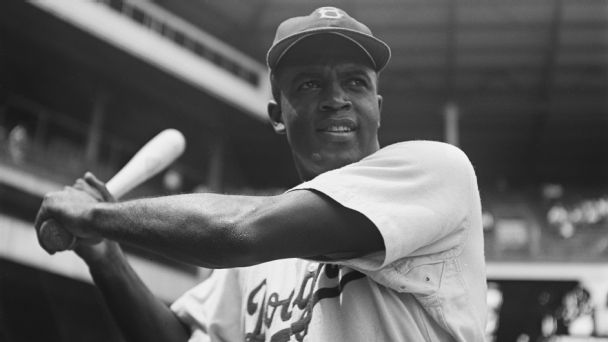Why Jackie Robinson’s story still resonates 75 years after his MLB debut

Editor’s Note: This story was originally published in April 2022 to celebrate the 75th anniversary of Jackie Robinson breaking the color barrier in Major League Baseball. Today, MLB is once again celebrating Jackie Robinson Day across sports.
FIVE YEARS AGO, during one of my oldest daughter’s first little league games of the season, I noticed her bouncing around at first base on every field. It was clear that she was impersonating someone and given the fact that the only game she saw me play in at the time was the Hall of Fame game when she was 3 years old, she definitely wasn’t copying me.
She continued to steal a base every chance she got.
When forced to explain her sudden love affair with stealing bases and advancing aggressively down every pitch, she dropped a name:
Jackie Robinson
Prior to this baseball season, my daughter, who turns 13 this summer, had been watching the movie “42” at home and parental protection was on high alert. We wondered if it was age appropriate, but we also knew that Robinson’s story was too important to pass up an opportunity to share it through a medium that resonates so well with this generation of fans: film entertainment.
By this point, our four children—one son and three daughters—already had a preliminary and personal understanding of some of the dynamics of racing in America: that the weight and power of racing sometimes blows your mind, no matter how prepared, what you think that it could be you But we prepared them anyway for the depiction of the awfulness of Philadelphia Phillies Manager Ben Chapman, as well as how spring training in Florida would put Robinson and his family under constant threat.
The film was well received, as evidenced by my daughter’s impersonation on the diamond. All my kids would become fans of Jackie Robinson the baseball player right away, but it was just as important to my wife and I to tell them the story of the complete Jackie Robinson. The figure who testified in court, marched into the street, opened a bank. Jackie Robinson wanted equality to give everyone the opportunity to play baseball — or do anything else.
Robinson spent his later life weaving his influence into other areas of American life. He had no intention of halting progress at first base, and his post-baseball endeavors became an extension of his Hall of Famer career and struck the conscience of boardrooms, the political elite, and institutions of power, including MLB. When he stopped, the line he crossed was not a finish line but a start line. His integration of baseball was an early domino in the civil rights gains that were to come, and even without a bat in hand, he was a part of it too. This broader picture of Robinson helps understand how relevant he remains 75 years after breaking into Major League Baseball: It was the kind of change that resonates and lasts.
LIKE MY CHILDREN, the story of Jackie Robinson was introduced to me growing up in New Jersey. His story has always been bigger than life for me, as it has been for so many children, young baseball players, and for black America. Jackie and his family are royalty to us, yet somehow they still feel close. But I was fortunate enough to be brought even closer by the opportunity Jackie gave me—a chance to play Major League Baseball.
I first met his widow Rachel just before the 1991 MLB draft. As a 20-year-old, it took my breath away to see her.
When I was playing for the Phillies in 1998, Jackie’s daughter, Sharon Robinson, embarked on a tour inspired by her family’s principles. It was called “Breaking Barriers” and one of the principles was education, so big gamers joined Sharon in the classrooms to talk about Jackie’s story (the program still exists today). I was chosen to meet her in Philadelphia, the city where I went to college and where I played to meet with students. The opportunity was surreal – it took me some time to understand what it was like to be a representative for Jackie Robinson, to know that his daughter would share my story with the next generation… to know that I had become a part of it was her Story.
I’ve done extensive media work to share the Robinsons’ story over the past two decades, including an interview with Rachel in Cuba in 2016, and there’s always been a bit of desperation in that because I worry about how Jackie Robinson’s legacy is holding up will have . It’s one of the greatest American stories of all time, but like any story, it can fade with time. A big step in preserving it is to share it with children young enough to be his great-great grandchildren.
I’ve seen the impact firsthand after speaking to players on the UCLA baseball team, a team Jackie once played as a four-athlete in his college days. In preparation for the Stanford-UCLA game today on Jackie Robinson Day, I interviewed two sons of my former teammate Eric Karros. I learned how much they knew about Jackie and how committed their trainer, John Savage, was to telling his story.
Then came the day my personal connection to the Robinsons extended to my own family. After meeting Sharon on this tour two decades ago, it has grown into a more solid friendship. A few years ago we were both playing phone tag and she accidentally called back while my oldest daughter was in the car. So they had a conversation. For me it was an overwhelming experience – listening to them talk about gymnastics and their childhood, two daughters of great players exchanging notes. I just got out of the way.
That’s when Jackie Robinson went from story to family for my daughter.
THE PARTS OF Robinson’s stories that endure are universal examples of what we all want from the world: relevance, respect, inclusion, fairness. Robinson did so with grace, fire, exceptional talent and a message that sought equality for all.
It helps that he was able to do this through sport — as Kyle Karros said during my interview from the UCLA dugout. “It’s not that he was just a great athlete, which he was,” Karros told me, “it’s that he represented so much more than just baseball… he used baseball as a vehicle to reach so many people.” make an impact, and that’s ultimately what we should strive for, to leave a positive lasting impact on the world we came into.”
Baseball gave Robinson a microphone, and he used it to confront and change the world, not just to amplify his personal success on the field.
This is a wonderful lesson for every generation.
Sharon has written several books about her family and her father’s legacy, one being a memoir about the year she turned 13 (Child of the Dream: A Memoir of 1963) and another (Stealing Home: An Intimate Family Portrait of Jackie Robinson’s Daughter) about her personal life during her father’s “retirement” — which really was anything but. (As Jackie wrote in a letter to Dwight Eisenhower, “I’ve gotten more aggressive since I stopped playing.”) They faced the same challenges as any family with a father who was away all the time and got sucked in as many did directions.
An entire nation – including Martin Luther King Jr. and a long list of US Presidents – looked to their father. But he would spend papa-daughter days in New York. And he would take the time to check the ice on their lake to see if it was frozen enough to skate on. Sharon would write one of the most beautiful passages I have ever read about this in “Stealing Home”:
It was Dad’s official job to test the ice on the lake to determine its safety for skating. We kids lined up along the shore and shouted words of encouragement as Dad walked out onto the snowy ice. Before putting one big foot in front of the other, he tapped the ice with his broomstick. After what felt like an eternity, Dad reached the deepest part of the lake, tapped his stick one last time, then turned to us and yelled, “Go get your skates!” I thought Dad was very brave.
Now I think it even more. He was as brave then as he was when he got into baseball, an accomplishment that took me years to appreciate. It was only gradually that it dawned on me what it had meant for him to break the baseball color line, what courage it had taken for him to enter uncharted and dangerous waters. He had to feel his way like a blind man down an uncleared path, tapping for clues. That was Jackie Robinson. And that was my father – big, heavy, out there alone on the lake, making his way so the ice was safe for us.
And he couldn’t swim.
75 years ago, Robinson played his first game with the Brooklyn Dodgers, breaking a color barrier for the first time in a major professional sport. It was also a world event that helped usher in a nation’s integration and inspired anyone who understands the pain of trying to cross a color line. This line was more like a wall covered with barbed wire, but Robinson climbed it anyway.
He has tested the ice for all of us, through his fearlessness, through moments of doubt, love, frustration – the path to social change is never a straight line. He did all this not only for his children, but for the children of his dreams. He also left messengers and parents, mentors and coaches who know that for all his accomplishments, at his core he has always tried to be a better father, because that love always endures.
My daughter would be stealing 30+ bases this little league season — by my calculations as an admittedly biased third base coach. She jumped from base to base, often taking another on a pass ball or a wild pitch. After realizing that few kids could consistently throw strikes, she stopped swinging the bat altogether and decided this was her best chance to get on base and show what she could do. She finished the season as a girl with two outcomes: walk or look out.
I told her that her strategy was sound, but that she couldn’t keep it up much longer—opposing pitchers would get better in the coming seasons. However, she didn’t care. Once you feel like Jackie Robinson, you will always be Jackie Robinson.






